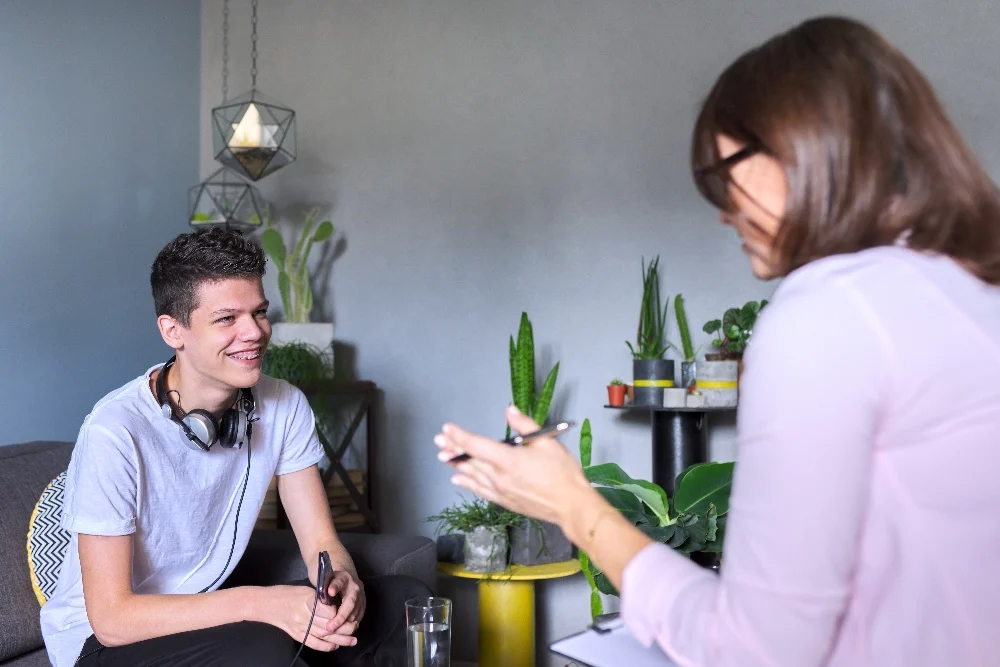Giving Your Suicidal Teen Hope
How Dialectical Behavior Therapy Can Help
Learning your child is having thoughts of suicide is terrifying for any parent. When suicidal urges become chronic or lead to multiple attempts, families can feel extremely helpless and afraid. As a parent, you desperately want to find an effective treatment that can save your teen’s life now and give them hope for the future.

Table Of Content
- Understanding Dialectical Behavior Therapy
- Skills Your Suicidal Teen Will Learn in DBT
- Supporting Evidence for DBT with Suicidal Teens
- Supporting Your Teen’s DBT Treatment
Dialectical behavior therapy (DBT) has emerged over the past two decades as the most promising therapy for recurrent teen suicidality. DBT provides adolescents with concrete skills to manage overwhelming emotions without resorting to self-destruction. With compassionate support from parents, DBT can help teens break free from ongoing suicidal crises.
Understanding Dialectical Behavior Therapy
DBT is a comprehensive, evidence-based treatment approach designed specifically to tackle persistent suicidal and self-harming behaviors. It was originally developed by psychologist Marsha Linehan for adults with borderline personality disorder exhibiting chronic suicidality.
DBT has since been adapted for suicidal adolescents. It teaches them mindfulness, distress tolerance, emotion regulation, and interpersonal effectiveness skills. The goal is to help teens build a life worth living, rather than constantly seeking a way to escape their problems through suicide.
There are four key components of DBT treatment for teens:
-
Individual therapy with a DBT-trained therapist: Your teen will attend 50-minute sessions 1–2 times per week to set treatment goals, learn skills, and receive support. The therapist also conducts suicide risk assessments.
-
Multi-family skills training group: Your teen will attend a 2–2.5-hour class each week alongside other teens and families to learn DBT skills together. This allows them to reinforce each others’ skills practice.
-
Phone coaching with the individual therapist as needed: Your teen will receive in-the-moment help applying skills to real-life situations and suicidal crises. The therapist is available by phone after hours.
-
Therapist consultation team: The DBT therapists meet weekly to review cases and support each other in providing the most effective treatment.
DBT balances change and acceptance strategies. Teens receive validation that their emotions and struggles make sense, rather than criticism for suicidal actions. With this compassionate stance, they can move forward with developing skills for a life worth living.
DBT is a comprehensive, evidence-based treatment approach designed specifically to tackle persistent suicidal and self-harming behaviors. It was originally developed by psychologist Marsha Linehan for adults with borderline personality disorder exhibiting chronic suicidality.
Skills Your Suicidal Teen Will Learn in DBT
Skills Your Suicidal Teen Will Learn in DBT
The DBT skills curriculum is specifically designed to provide alternatives to suicide actions. By learning these techniques, teens equip themselves with real options for getting through intensely painful moments mindfully. The skills fall into four main categories:
Mindfulness Skills
-
Observing present experiences, thoughts, and emotions without judgment
-
Focusing fully on the present moment
-
Using “Wise Mind” to balance emotion and reason
-
Participating fully in current activities
-
Practicing mindfulness through breathing, meditation, or walking
Distress Tolerance Skills
-
TIPP skills: changing temperature, intense exercise, paced breathing, progressive muscle relaxation
-
Distracting from emotional pain through activities, contributing, comparisons
-
Self-soothing through the five senses
-
Radically accepting the present moment through mantras like “it is what it is”
Emotion Regulation Skills
-
Identifying and labeling emotions
-
Understanding emotion functions and prompts
-
Reducing vulnerability to negative emotions
-
Increasing positive emotional events through scheduling fun activities
-
Opposite action and problem-solving to change painful emotions
-
Checking the facts to gain a wise perspective
Interpersonal Effectiveness Skills
-
Obtaining objectives skillfully through compromise and maintaining relationships
-
Asking for what you need assertively
-
Standing up for your values with empathy
-
Building mastery and coping ahead for challenging interactions
Teens work extensively with their individual therapist and group to learn how and when to apply each skill to counter suicidal urges. With repeated coaching and practice, they develop the tools to manage crises independently.
The DBT skills curriculum is specifically designed to provide alternatives to suicide actions. By learning these techniques, teens equip themselves with real options for getting through intensely painful moments mindfully.
Supporting Evidence for DBT with Suicidal Teens
Supporting Evidence for DBT with Suicidal Teens
Over two decades of research demonstrates DBT significantly reduces suicide attempts, self-harm, depression, and suicide ideation in adolescents with recurring suicidality. Studies have shown DBT-treated youth have:
-
Fewer suicide attempts during treatment, with greater time between attempts
-
Reduced medical hospitalizations for suicidal behavior or self-injury
-
Decreased feelings of hopelessness and greater reasons for living
-
Increased use of adaptive coping skills when under stress
-
Improved treatment motivation and compliance
-
Lower risk for future suicide attempts after completing DBT
In multiple studies, 70–80% of suicidal teens receiving DBT achieved complete remission of suicidal thoughts and urges. They also exhibited fewer angry outbursts, impulsive actions, and self-destructive behaviors.
Researchers believe teaching adaptive coping skills along with core mindfulness gives suicidal teens real alternatives to choosing suicide in moments of unbearable pain. This provides hope that their suicidal urges can be overcome, rather than feeling permanently stuck in a cycle of crises.
In numerous studies, DBT had significantly better outcomes than routine medical care or general talk therapy. Teens receiving DBT are far less likely to require costly psychiatric hospitalizations after learning to use skills. These empirically-validated findings give parents reassurance that DBT is a wise investment for helping suicidal youth.
Over two decades of research demonstrates DBT significantly reduces suicide attempts, self-harm, depression, and suicide ideation in adolescents with recurring suicidality.
Supporting Your Teen’s DBT Treatment
Supporting Your Teen’s DBT Treatment
DBT depends on a strong collaboration between therapists, parents, and teens. As a parent, you play a pivotal role by reinforcing your teen’s new skills at home. Specific ways to assist their treatment include:
-
Attend family DBT sessions: Learn what skills your teen is taught and how to prompt skill use.
-
Encourage skills practice: Praise even small efforts, without criticism. Track successes on mobile apps.
-
Monitor access to suicidal means: Lock up weapons, medications, or other means of self-harm.
-
Participate in safety planning: Know what to do if your teen’s suicidal thoughts increase.
-
Share observations with your teen’s treatment team: Provide feedback to improve their care.
-
Model DBT skills yourself: Teach siblings skills to foster a mindful family environment.
-
Self-care: Get support through parent groups, counseling, or taking breaks. Recognize your efforts to help your teen.
-
Trust the process: Have patience as your teen learns skills gradually. Setbacks are normal and do not mean DBT has failed.
While not easy, you can partner with your teen to help them gain hope, meaning, and skills for overcoming recurrent suicidality. DBT provides the most effective roadmap for this healing journey as a family.
In numerous studies, DBT had significantly better outcomes than routine medical care or general talk therapy. Teens receiving DBT are far less likely to require costly psychiatric hospitalizations after learning to use skills.
Get help with Idaho Youth Ranch
Teen Counseling
Our masters-educated and trained therapists and counselors have the experience your young person needs to find healing.
Family Counseling
Idaho Youth Ranch can help your family reconnect, open up lines of communication, and build more positive relationships.
Group Counseling
Group therapy helps young people, ages 9 to 24, to address trauma, dangerous behaviors, troubling feelings or experiences.
Equine Therapy
Working with horses has been a proven method of emotional recovery and one of the unique services offered by Idaho Youth Ranch.




